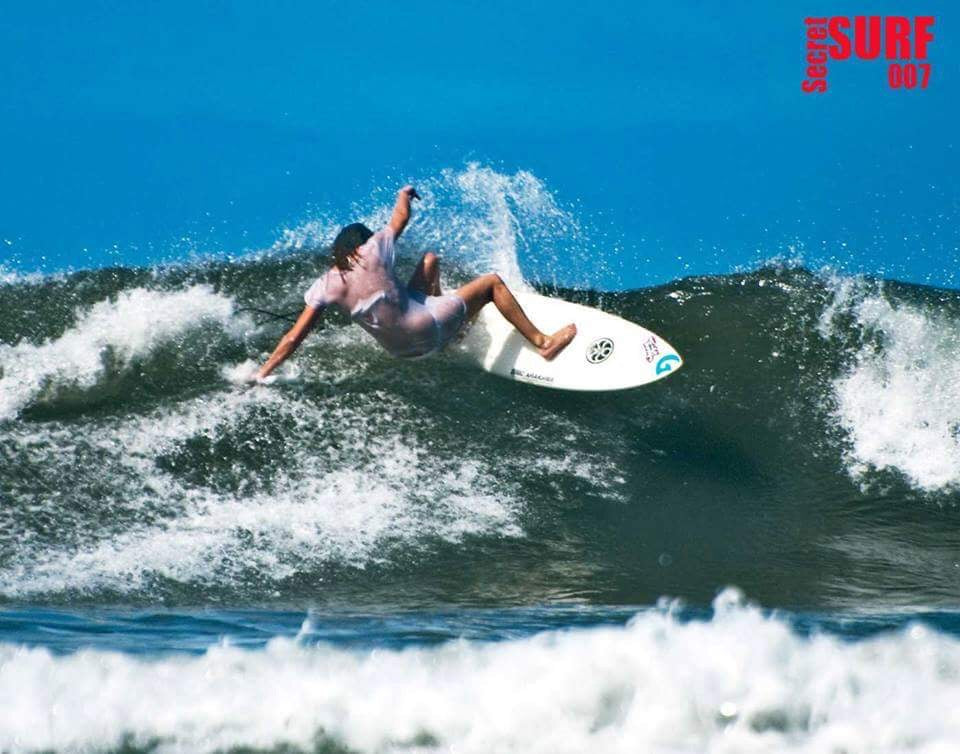Less than two years ago Sarah Dean was riding big waves among big names in Hawaii as a rising able-bodied athlete. Then came the accident.
After departing a bus for an evening walk home on Bainbridge Island, where she grew up, Dean was struck head on by a Dodge Dakota traveling 65 miles per hour.
“I got knocked over guardrail and into ravine,” recalls Dean, who had bones protruding through the skin in her leg and hand. “I remember saying to myself, ‘If I stay here I’m going to die here.’ I knew I needed to move, and if I didn’t, it was death.”

She was found and flown to a hospital where doctors were forced to amputate her right leg below the knee. Despite the shocking reality of losing a limb, Dean says she accepted it from the moment it happened. “I remember there being this sense of relief, like I felt I’d found my purpose in life. I was not looking for it. This came to me.”
Now her sole purpose is to represent for female below the knee amputee (BKA) surfers. “I want to be the first to take it to big waves,” she says. “For me this is it—find your one passion and do that for the rest of your life.”
It’s a mission not unlike surfer Bethany Hamilton’s amazing rise after losing her right arm in a shark attack at age 13, or World Adaptive Surf champion Dani Burt’s, who following a tragic motorcycle crash now represents for above the knee amputee athletes.

But Dean is unapologetically her own breed. Age 35 and a recovering alcoholic, she’s been doing it her way for a while. “That’s what I love about being connected with Nectar. It’s a really creative company that allows you to make mistakes,” says Dean, who regularly rocks her Nectar polarized Beryls, especially for spotting colors when shooting photos. “Being around creative, cool people really brings it out of me.”
Much of the pressure that’s pushed Dean in big waves—and over the edge sometimes—has been an intangible she’s put on herself. “I’m adopted and I couldn’t have handpicked cooler parents, but I had this innate thing that everything I did had to be pro level,” she says. “That hindered my surfing—it was aggression, not flow.”

Not now. Dean is motivated by staying clean and getting up every day in effort to get back to Hawaii, where her heart remains. But on Brainbridge, 12-mile-long island, water is everywhere, beckoning her back to the surf. And she’s not ready yet.
Eight months out of surgery Dean stood up on a long board at the World Championships. It wasn’t pretty, but it was the first step. There’s more work to be done—and she needs to finance a surf-specific prosthetic, about three inches smaller than her walking leg.
Dean has foregone traditional physical therapy. “I taught myself how to walk and now I’m teaching myself how to run,” she says. “ Just like a baby, I’m redoing it all.”
She trains in the pool on a short foam training board by Surfinshape. “It’s like a little disc that gets everything that you can’t get at the gym and feels like I’m riding on my 6.3 board,” she says. ”If it wasn’t for this board I wouldn’t be where I am today.”

The road ahead is long, but Dean is all in. She’s connected with Access Surf, a nonprofit that is matching her with adaptive teammates—and an emotional boost.
“Surfing has always been the only place I felt at home. Without it I’m like fish out of water. All I do is watch surfing videos,” she laughs. “But every day is better than the last. I just have to be patient—and slow down.”
All photos courtesy of Sarah Dean



